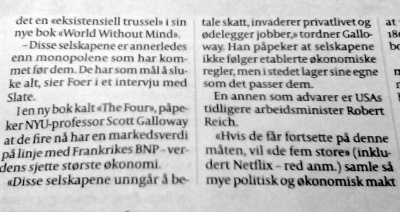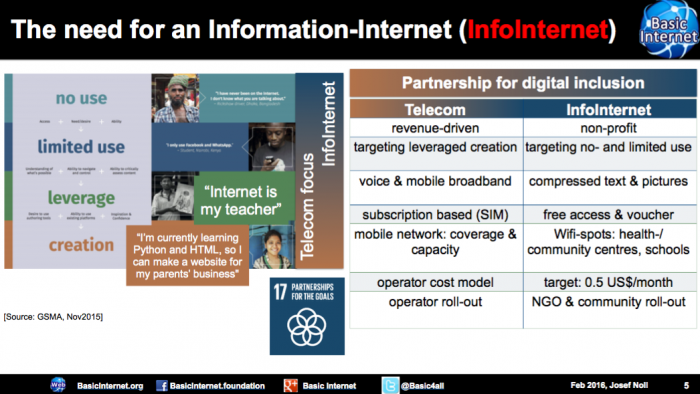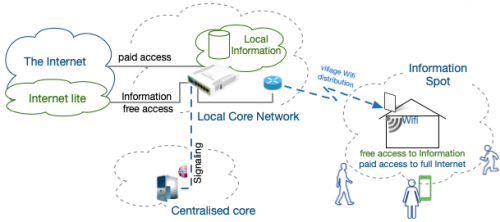Basic Internet Feedback to Malta keynote - Internet lite for all
| Wiki for ITS | ||||||
|---|---|---|---|---|---|---|
|
Basic Internet Feedback to Malta keynote
| Course | UNIK4700, UNIK9700 |
|---|---|
| Title | Basic Internet Feedback to Malta keynote (Fxx) |
| Lecture date | 2017/10/24 1315-1600 |
| presented | by Josef Noll |
| Objective | Understand the basic Internet principles, and the InfoInternet future standard |
| Learning outcomes | Having followed the lecture, you have
|
| Pensum (read before) | Go through the attached presentation; establish questions to the presentation; read about FreeBasics from Facebook |
| References (further info) | |
| Keywords | Wifi, Radio channel models, BasicInternet |
this page was created by Special:FormEdit/Lecture, and can be edited by Special:FormEdit/Lecture/Basic Internet Feedback to Malta keynote.
discussed...page15++
Media:201510_BasicInternet_Keynote_Malta.pdf
- Title
- UNIK4700 Basic Internet Keynote
- Author
- Josef Noll
- Footer
- Basic Internet Feedback to Malta keynote
- Subfooter
- UNIK4700/UNIK9700
⌘ Requirements for #Basic4All
The mobile Internet access is the dominant way of accessing information for the majority of people in the world.
However, health and education services are predominantly provided through fixed infrastructures, as their values for end-customers is not obvious.
- InfoInternet-standard: text, pictures, other html 5
- Network infrastructure for filtering on App level, e.g. WhatsApp text & pictures versus voice messages, calls and video
- Village platform with local information, e.g. health video
- Value proposition for countries and operators
⌘ InfoInternet
Keyword Basic Internet Feedback to Malta keynote
| Basic Internet Feedback to Malta keynote | |
|---|---|
| Wikipedia | |
| Related keywords | Basic Internet, Internet, Internet.org, Standard, Internet Lite |
| All pages containing keywords | |
(edit page)
InfoInternet is the standard for Internet Lite for all, the free access to text and pictures, as well as local videos, as bearers of information.
Free access to information (i.e. text and pictures) is the catalyst for the Sustainable Development Goals (SDGs) of the Agenda 2030. The direct focus is on target 9.C focussing a.o. on affordable access to the Internet, which is directly addressed through the InfoInternet standard. Our expectation is that free access to information is a basis for digital health in SDG 3, digital information for education in SDG 4, and digital jobs and economic growth in SDG 8. Free digital information access will thus become a strong contributor in reducing inequalities (SDG 10), and make human settlements inclusive (SDG 11).
Combining free access to information with paid access to amusement (i.e. video, gaming, other streaming) creates a sustainable business model for mobile operators and Internet Service Providers (ISPs). InfoInternet targets people, who have less than 3 US$/day. Enabling the walk on the Internet through InfoInternet is a way of reaching the people at the bottom of the pyramid, and is the entry door to inclusion in the digital society.
The provision of InfoInternet is complementary to mobile operators, focussing on customers with higher ability to pay. In combination, providing InfoInternet as part of the mobile network will empower people and base their way to members of the digital society.
Application areas for Internet Lite for all are addressing:
- the need for information access regardless of the subscription
- a network slice for emergency operations, focus on information
Examples of the InfoInternet are the implementation made by the Basic Internet Foundation through the DigI project. Discussions are ongoing on the implementation of the standard, being
- a protocol like https://basicinternet.info&standard=InfoInternet
- a proxy as used by googleweblight.com or opera proxy
- the amp format used by Google for news caching
Suggestion: use the United Nations Platform to provide amp format
- AMP — which stands for Accelerated Mobile Pages — was introduced by Google in October of 2015. AMP is an open-source custom web development framework created to speed up the loading time of web pages on mobile devices. Read more at: https://devopedia.org/accelerated-mobile-pages
Current implementation is through White Lists or Black Lists (see DigI:TI1.1#Content_filtering for details). Further aspects on White List filtering for access are addressed here.
The InfoInternet can also be used for IoT devices to connect to and be integrated into a home network, see Masterthesis on Device Integration into the Home Network.
Contains pages with keyword "Basic Internet Feedback to Malta keynote".
Related information
⌘ Network infrastructure
Goal:
- filter on text and pictures = free service, including local video
- video, voice, and other streaming = paid service
HowTo
- Data-base for App information, evtl. white list/black list
- Global or country-wide Network Control Centre for voucher creation
- Local control centre for traffic monitoring and filtering
- Proxy solution for content monitoring
⌘ Proxy solution
Browsers
- Example: Opera Mini
Apps
- Content type filtering, based on
- App ID
- IP address range
- Ports
- packet inspection (https challenge)
Q: do we need browser standard, or can we perform all through proxy?
⌘ Value proposition
For countries
- free access to health information
For operators
- only 2-3% are used for InfoInternet, >97% for commercial services
- in-kind provision of bandwidth, Universal Service Communication Access Funds (USCAF)


